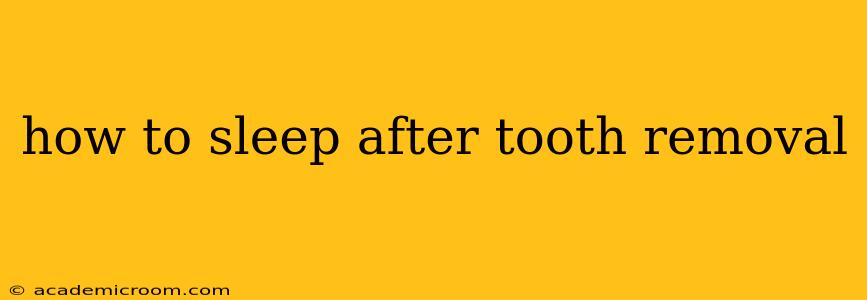Having a tooth extracted can be a somewhat uncomfortable experience, and getting a good night's sleep in the aftermath is crucial for proper healing. This comprehensive guide will walk you through the best practices for sleeping comfortably and promoting optimal recovery after tooth extraction. We'll address common concerns and provide practical tips to ensure a restful night's sleep.
What Position is Best for Sleeping After Tooth Extraction?
The ideal sleeping position after a tooth extraction is on your back, slightly elevated. This helps minimize bleeding and swelling. Prop yourself up with extra pillows to keep your head and upper body raised at a comfortable angle. Avoid lying directly on the extraction site, as this can increase discomfort and potentially disrupt the blood clot formation crucial for healing.
How Can I Reduce Swelling and Pain After Tooth Extraction?
Reducing swelling and pain is key to a comfortable sleep. Your dentist will likely prescribe pain medication; follow their instructions carefully. Applying ice packs to your cheek near the extraction site for 15-20 minutes at a time, with breaks in between, can significantly reduce swelling in the first 24-48 hours. This should be done before bed and at intervals throughout the day. Elevating your head also helps minimize swelling.
What if I Have Severe Pain After Tooth Extraction?
Severe pain or uncontrolled bleeding requires immediate attention. Contact your dentist or oral surgeon immediately if you experience:
- Excessive bleeding: Bleeding that soaks through gauze pads consistently.
- Intense, unbearable pain: Pain that isn't relieved by prescribed medication.
- High fever: A temperature significantly above normal.
- Increasing swelling: Swelling that worsens dramatically.
- Signs of infection: Pus, redness spreading beyond the extraction site, or increased warmth in the area.
What Can I Eat and Drink Before Bed After Tooth Extraction?
Avoid eating anything that requires significant chewing or could irritate the extraction site. Soft foods like yogurt, applesauce, mashed potatoes, and soup are good choices. Drink plenty of fluids, but avoid using a straw, as the suction can dislodge the blood clot. Sip on water or clear broths.
What Foods Should I Avoid After a Tooth Extraction?
Stay away from hard, crunchy, or spicy foods. Also, avoid anything that could get lodged in the socket. This includes things like nuts, seeds, popcorn, and anything requiring excessive chewing.
Can I Sleep on My Side After Tooth Extraction?
While sleeping on your back is recommended, many find it difficult. If sleeping on your side is unavoidable, try to sleep on the side opposite the extraction. Use extra pillows to support your head and keep the extraction site elevated. Avoid placing pressure directly on the affected area.
How Long Does it Take to Recover From Tooth Extraction?
Recovery time varies depending on the complexity of the extraction. Most people experience significant improvement within a week, but complete healing can take several weeks. Listen to your body, and don't push yourself too hard during recovery. Getting adequate rest is a critical part of the healing process.
When Can I Resume Normal Activities After Tooth Extraction?
Your dentist will give you specific instructions regarding returning to normal activities, including work and exercise. Generally, it's advisable to avoid strenuous activity for the first few days to minimize swelling and potential complications. Follow your dentist's advice regarding resuming your regular routine.
Should I Take Any Over-the-Counter Medications for Pain Relief?
While your dentist will prescribe pain medication, over-the-counter options like ibuprofen (Advil, Motrin) or acetaminophen (Tylenol) can help manage mild pain and discomfort. Always follow the dosage instructions on the label and consult your dentist or doctor if you have any questions or concerns.
By following these tips, you can significantly improve your chances of getting a restful night’s sleep and promoting a smooth recovery after tooth extraction. Remember, prioritizing rest and following your dentist's instructions are crucial for a successful healing process.
